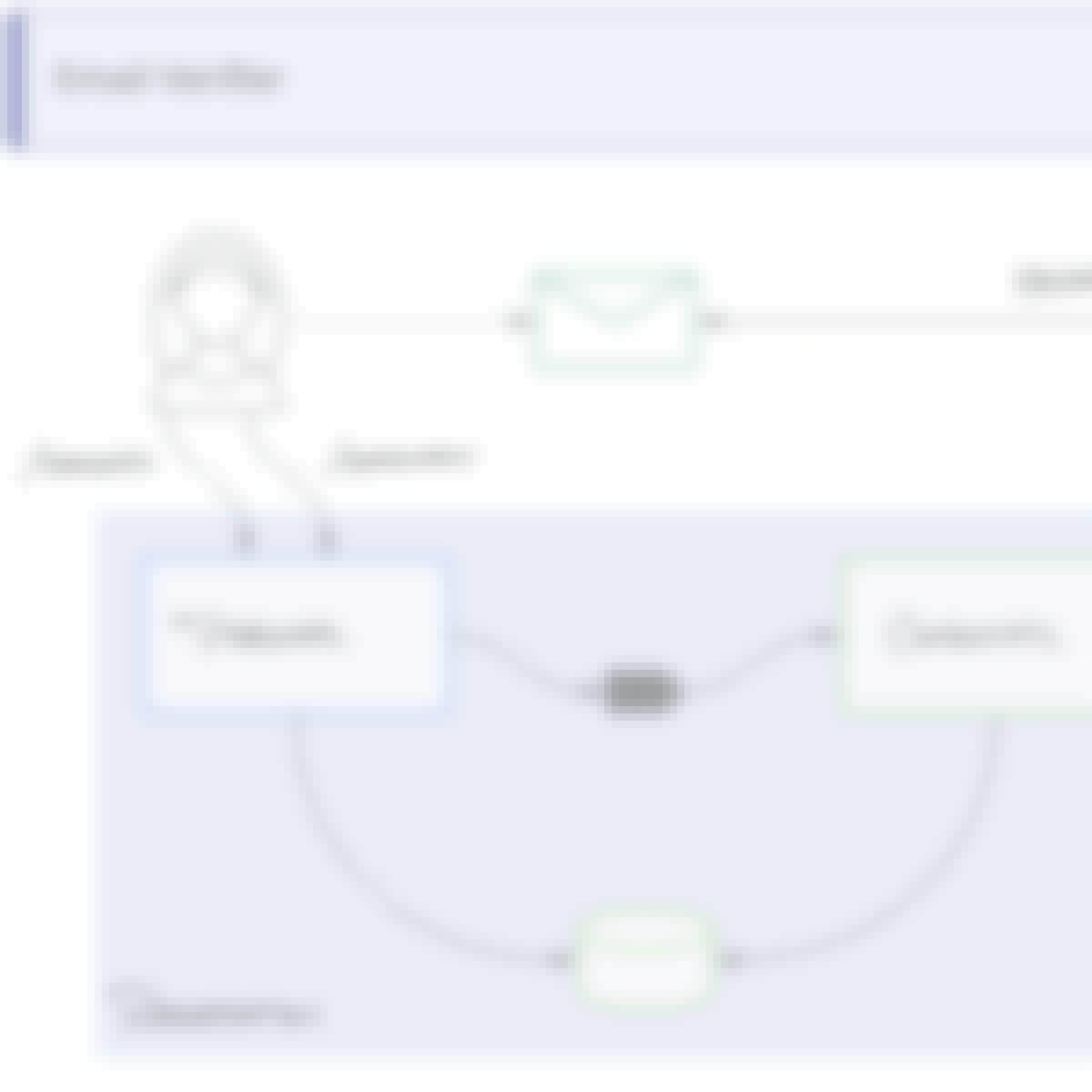- Browse
- Sql
SQL Courses
SQL courses can help you learn database design, data manipulation, query optimization, and data retrieval techniques. You can build skills in writing complex queries, managing relational databases, and ensuring data integrity. Many courses introduce tools like MySQL, PostgreSQL, and Microsoft SQL Server, demonstrating how to use these platforms for data analysis and reporting. You'll also explore key topics such as joins, indexing, and transaction management, which are vital for effective data management and analysis.
Popular SQL Courses and Certifications
 Status: Free TrialFree TrialM
Status: Free TrialFree TrialMMicrosoft
Skills you'll gain: Data Security, Cloud Security, Azure Active Directory, Microsoft Azure, Data Storage, Encryption, Cloud Storage, Authorization (Computing), Authentications, Database Management, Data Governance, Key Management, Identity and Access Management, Firewall, Threat Detection
4.5·Rating, 4.5 out of 5 stars15 reviewsIntermediate · Course · 1 - 3 Months
 Status: Free TrialFree Trial
Status: Free TrialFree TrialSkills you'll gain: Model Deployment, Google Cloud Platform, Dataflow, Data Pipelines, Real Time Data, Data Lakes, PySpark, Apache Kafka, Tensorflow, Data Governance, Apache Spark, Dashboard, Data Warehousing, Data Import/Export, Data Processing, Extract, Transform, Load, Unstructured Data, Data Integration, Metadata Management, Big Data
4.4·Rating, 4.4 out of 5 stars58 reviewsIntermediate · Specialization · 3 - 6 Months
 Status: NewNewStatus: Free TrialFree Trial
Status: NewNewStatus: Free TrialFree TrialSkills you'll gain: Distributed Denial-Of-Service (DDoS) Attacks, Metasploit, Penetration Testing, Malware Protection, Exploitation techniques, Database Management, Cyber Threat Intelligence, Vulnerability Assessments, Cyber Security Assessment, Brute-force attacks, Cryptography, Cybersecurity, Vulnerability Scanning, Intrusion Detection and Prevention, Data Import/Export, MySQL, Encryption, Mobile Security, Linux, Linux Administration
4.8·Rating, 4.8 out of 5 stars52 reviewsBeginner · Specialization · 3 - 6 Months
 Status: Free TrialFree TrialD
Status: Free TrialFree TrialDDuke University
Skills you'll gain: Performance Analysis, Apache Airflow, Workflow Management, Vector Databases, Scalability, Database Management Systems, Database Management, Data Pipelines, Data Architecture, Real Time Data, MySQL, Complex Problem Solving, Data Import/Export, Data Transformation, Graph Theory
4.3·Rating, 4.3 out of 5 stars19 reviewsIntermediate · Course · 1 - 4 Weeks
 Status: Free TrialFree TrialU
Status: Free TrialFree TrialUUniversity of California, Irvine
Skills you'll gain: Dashboard, Data Visualization Software, Data Visualization, Business Reporting, SAS (Software), Interactive Data Visualization, Cloud Computing Architecture, Data Storytelling, Business Intelligence, Business Analytics, Data Warehousing, Cloud Computing, Big Data, Machine Learning, Data Import/Export
4.1·Rating, 4.1 out of 5 stars31 reviewsIntermediate · Course · 1 - 4 Weeks
 A
AAmazon Web Services
Skills you'll gain: AWS Identity and Access Management (IAM), Amazon DynamoDB, Amazon S3, Amazon Elastic Compute Cloud, API Gateway, Serverless Computing, Cloud API, Amazon Web Services, Authentications, Authorization (Computing), NoSQL, Data Storage
4.6·Rating, 4.6 out of 5 stars33 reviewsBeginner · Course · 1 - 4 Weeks
 Status: Free TrialFree TrialL
Status: Free TrialFree TrialLLearnKartS
Skills you'll gain: Site Reliability Engineering, Infrastructure as Code (IaC), Google Cloud Platform, Dataflow, Cloud Services, Application Deployment, Cloud Computing Architecture, Identity and Access Management, Cloud Infrastructure, Google App Engine, Kubernetes, Cloud Solutions, Cloud Computing, Cloud Storage, Cloud Management, CI/CD, Cloud Security, Network Monitoring, Big Data, Load Balancing
4.7·Rating, 4.7 out of 5 stars15 reviewsIntermediate · Specialization · 1 - 3 Months
 Status: Free TrialFree TrialI
Status: Free TrialFree TrialIInfosec
Skills you'll gain: Open Web Application Security Project (OWASP), Secure Coding, Distributed Denial-Of-Service (DDoS) Attacks, Application Security, Security Testing, Authorization (Computing), Authentications, Data Validation, Encryption, Security Controls, Data Security, Vulnerability Scanning, Role-Based Access Control (RBAC), Verification And Validation, Intrusion Detection and Prevention, Database Application, Security Awareness, Cybersecurity, Web Servers, Web Development Tools
4.5·Rating, 4.5 out of 5 stars25 reviewsBeginner · Specialization · 1 - 3 Months
 Status: Free TrialFree Trial
Status: Free TrialFree TrialSkills you'll gain: Identity and Access Management, Google Cloud Platform, Cloud Infrastructure, Infrastructure As A Service (IaaS), Cloud Computing, Cloud Services, Data Storage Technologies, Cloud Storage, Security Management, System Monitoring, NoSQL, Encryption, SQL, Scalability
4.7·Rating, 4.7 out of 5 stars148 reviewsIntermediate · Course · 1 - 3 Months
 Status: Free TrialFree TrialF
Status: Free TrialFree TrialFFundação Instituto de Administração
Skills you'll gain: Big Data, Data Mining, Data-Driven Decision-Making, Marketing Automation, Marketing Strategies, Customer experience strategy (CX), Digital Transformation, Marketing Analytics, Ggplot2, Marketing, Data Visualization Software, Plot (Graphics), Data Modeling, R Programming, Analytics, Data Science, Data Analysis, Innovation, Business Analytics, Data Manipulation
4.2·Rating, 4.2 out of 5 stars60 reviewsBeginner · Specialization · 1 - 3 Months
 Status: Free TrialFree TrialU
Status: Free TrialFree TrialUUniversity of Colorado Boulder
Skills you'll gain: Performance Testing, Scalability, Data Architecture, Software Architecture, Distributed Computing, Predictive Modeling, Performance Tuning, Microservices, Big Data, Software Engineering, Database Systems, Data Store, Model Evaluation
Build toward a degree
3.6·Rating, 3.6 out of 5 stars30 reviewsAdvanced · Course · 1 - 4 Weeks
 Status: Free TrialFree TrialU
Status: Free TrialFree TrialUUniversity of Glasgow
Skills you'll gain: Data-Driven Decision-Making, Data Literacy, Business Transformation, Strategic Leadership, Leadership, Leadership Development, Business Leadership, Agile Methodology, Leadership Studies, Organizational Leadership, Data Analysis, Organizational Structure, Big Data, Leadership and Management, Organizational Change, Agile Product Development, Team Leadership, Decision Making, Data Management, Critical Thinking
4.8·Rating, 4.8 out of 5 stars48 reviewsIntermediate · Specialization · 1 - 3 Months
In summary, here are 10 of our most popular sql courses
- Secure Your Data at Rest: Microsoft
- Data Engineer, Big Data and ML on Google Cloud en Français: Google Cloud
- Kali Linux: Ethical Hacking & Pentesting: EDUCBA
- Advanced Data Engineering: Duke University
- Business Intelligence and Visual Analytics: University of California, Irvine
- Integrating AWS with the SDK: Amazon Web Services
- Google Professional Cloud Architect Prep: LearnKartS
- Secure Coding in Laravel: Infosec
- Essential Cloud Infrastructure: Core Services em Português Brasileiro: Google Cloud
- Machine Learning Aplicado ao Marketing: Fundação Instituto de Administração










